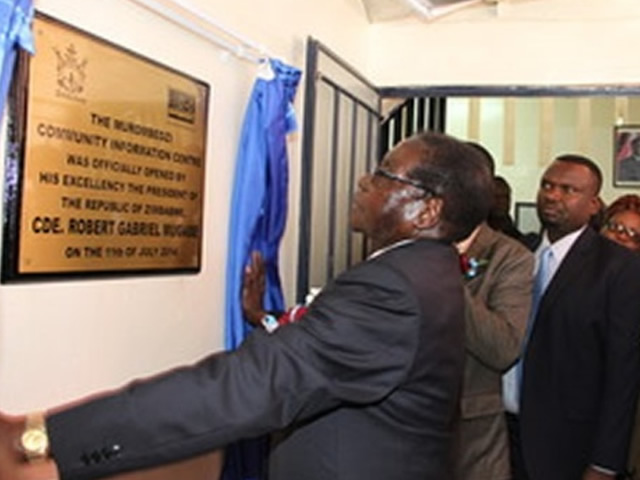Indigenising digital revolution

Stanely Mushava : Features Correspondent
The universal penetration of information and communication technologies (ICTs) is one of the defining phenomena of the 21st century. However, like any revolution, it is characterised by its own power relations: creators and receivers, metropolises and vassals, participants and spectators. For all the possibilities it is generating, the ICT revolution will not be complete until developing countries generate their content and build their own tools.Indigenising, democratising and incentivising ICTs on the home turf is turning out to be an imperative that countries cannot downplay if they are to get the most out of the digital revolution.
Zimbabwe is stepping up to the challenge, first by mainstreaming ICT into the education sector from Early Childhood Development (ECD) to higher education.
ICT now features at every stage of the basic education as a stand-alone subject and as a cross-cutting function in the new curriculum framework of the Ministry of Primary and Secondary Education.
It is also a critical element of the Science, Technology, Engineering and Mathematics (STEM) initiative of the Ministry of Higher and Tertiary Education, Science and Technology Development.
In a wide-ranging interview with Herald Review, the Deputy Minister of Information and Communication Technology, Postal and Courier Services Dr Win Mlambo hailed the mainstreaming of ICT in the education sector as an important step.
“Childhood is the critical period within which a person imbibes fundamental knowledge. Therefore introducing an important element to the curriculum like ICT at the right developmental stage is the right thing to do,” Dr Mlambo said.
“Children learn faster and easier. It becomes difficult to take on subjects like ICT, Engineering and Mathematics when the person has missed that critical period, hence the significance of the decision taken by Government,” he added.
“ICTs are overarching all the other sectors which is why the Ministry of ICT, Telecommunications, Postal and Courier Services is in every cluster in the context of Zim-Asset. These days if you want to do anything more efficiently, successfully and accurately, you need to involve ICTs. It could be Mathematics, Commerce or Physics, ICT are involved,” he said.
Dr Mlambo said his ministry’s mandate is to create an ICT-enabling environment within which other sectors, including education, can then develop.
He described e-learning, whereby tutorials and educational content are conveyed electronically, as a democratising feature of the ICT revolution.
However, he emphasised the importance of taking charge of that revolution by indigenising content.
“With respect to culture and indigenous languages, we are encouraging that local content be developed. There is need to develop content which dovetails with our nationality rather than indiscriminately importing from across the borders as that will erode indigenous values.
“Foreign content is bound to dominate e-learning when the programmes are developed outside the borders. Therefore, we are fast moving towards a paradigm of our own content.
“We are reviewing the National ICT Policy and one of the emphasis is the development of local content in e-learning not only to preserve the cultural values of Zimbabwe but also to make it easier for citizens to learn because they learn better in an environment they grew up in,” Dr Mlambo said.
Moving to an indigenised paradigm of ICT requires incentives for innovation. The deputy minister said incentives were in place to make Zimbabwe a major ICT hub in Africa, not just as a receiver but as a creator.
“We want to bring relevant technology to small and medium enterprises (SMEs) which are the mainstay of the Zimbabwean economy. There are a number of incentives we are coming up with including incubation of young entrepreneurs,” Dr Mlambo said.
“The ministry is also setting up a Young Technology Entrepreneurs Fund to incentivise young entrepreneurs to come up with ICT innovations which then they must quickly patent and commercialise.
“We already run awards for outstanding ICT performers. The idea is to tease the talent and encourage new ways of conducting business,” he said.
ICT is a male domain at the moment with authors like Andrew Keen faulting it as the preserve of “young white men.” Zimbabwe’s ICT ministry has moved to balance the demographics with the Girls in ICT initiative.
“Girls in ICT is an attempt to bridge the gender gap in Zimbabwe in tandem with SADC expectations and also International Telecommunications Union (ITU) expectations, UN expectations,” Dr Mlambo said.
Major booksellers, publishers and record companies are closing shop or scaling down production, leading to the loss of monumental works of art and educational content.
While this can be attributed to the creative destruction occasioned by digitisation, Dr Mlambo said ICTs are both the problem and the solution.
“As ICTs take hold, there must be an adjustment of the host society to fit contemporary ICTs. Take the example of art, you discover that there is a lot of digital content which can be downloaded from the Internet, moving away from the traditional formats,” the deputy minister said.
He added that they had encouraged safeguarding of intellectual property saying lately the World Intellectual Property Organisation had been developing methods to ensure that cultural inventions, even when they are electronic, were not copied willy-nilly.
“Despite the disruption, business must continue but in a different form, in a digital form. It is unfortunate that technology is so dynamic that it moves at a faster rate than people are becoming aware of the need to adjust to the contemporary way of doing business whether it is digital or otherwise. Technology is going to impact on us. We must respond by adjusting,” he added.
Dr Mlambo acknowledged a trend whereby trending local innovations seem to be Zimbabwean versions of what is already existing elsewhere rather than original in the fundamental sense.
He said building on what is already in place is a natural step before leapfrogging to better products, a process which can be sped up by incentives for innovation.
There is potential for research and access to content to improve significantly through exploitation of ICT but students and lecturers seem to be sticking to old methods oblivious to the resources and tools available to them.
Dr Mlambo attributed the problem to lack of awareness of the limitless resource that ICTs can be when ably manipulated and technophobia.
“We need to drive out technophobia so that people interact with ICT and get the most out of it. We hold lectures at the Treasury Computer Bureau at every level of Government in order to create awareness of what ICT can do.
“Lack of capacity is a major problem in the country. We try to build that through formal training, through workshops and conferences to try and make people aware of contemporary ICT.
“There are initiatives we are taking in schools cognisant of the fact that if you teach children, you have taught the entire country. So together with the Ministry of Primary and Secondary Education, we have programmes like Connected School and Connected Community.
“There are other initiatives like Lab per School where again we provide a laboratory of 40 computers and a printer, ideally for each school across the country, but because of limited resources, we have not yet reached the target,” he said.
The deputy minister lauded the Presidential Computerisation Scheme and the Presidential E-Learning Programme initiated by President Robert Mugabe as a solid foundation for ongoing successes.
“President Mugabe is the one who started the computerisation scheme and everyone was open to the vision. We are perpetuating the vision into a legacy.
“There were pilot projects at Chogugudza Primary School and John Landa Nkomo Secondary School where again these initiatives were piloted so that people see what we are doing,” he added.
If the digital revolution is to be democratic, there is need to extend the infrastructure to rural areas which lack electricity and connectivity.
The ICT ministry has piloted Community Information Centres (CIC) in Zvimba and Matebeleland South.
The CIC, a one-stop information hub for businesses and education facilities in rural communities, connected to Internet so that people can go there for everything, playing, information, entertainment and education.
“These are initiatives that are helping people as we move towards the 2020 target of a digital SADC. It is becoming a right not a privilege that people be connected to Internet and lack of connectivity is becoming a serious violation.
“Companies which provide Internet have commercial imperatives so they invest in ICT where they know they will recoup their investments. We now in Government have to deal with those areas that are shunned by commercial entities,” he said.
He said they had the Universal Services Fund whose mandate was to go to such areas and set up infrastructures.
“We have to provide broadband so that as information flows, there is no bottleneck,” he said.
With the democratisation of digitally-enabled infrastructure, mainstreaming of ICT into the education sector and incentivisation of innovation, the stage is set for enterprising young Zimbabweans to make the country not just a recipient but a creator in the digital revolution.
Feedback: [email protected]












Comments